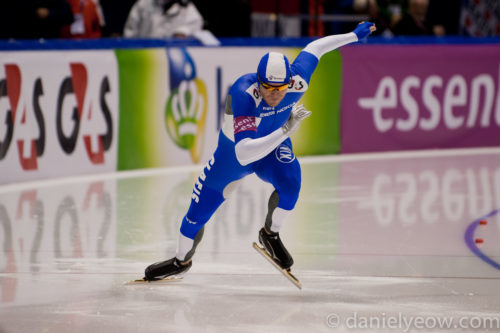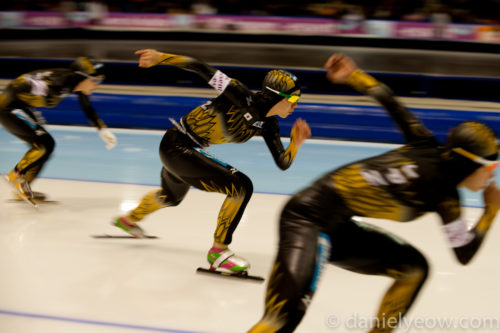Pyeongchang Day 10: Mens 500m
Recap
This was less unexpected than I expected. In first place Håvard Lorentzen, the skater with the most world cup victories going into the games (although to be fair, I’m fairly certain that that’s the first time this has happened), in second Korean Min Kyu Cha, and in third junior world record holder Tingyu Gao of China, who I actually coincidentally once trained with when a group of chinese skaters visited Heerenveen in the summer for a training camp. In the end it came down to who could put down the best flying lap time, with Gao the only skater in the competition to do his first 100m in under 9.5 seconds. Lorentzen started with a decent but not mind-blowing 9.74 seconds, but followed it up with an insane 24.67 second lap the fastest of the competition, and not likely to be bettered until the 1000m which happen on Friday, and even then only a handful of skaters will skate a lap faster than that. Tsubasa Hasegawa and Daniel Greig in the first pair set a very good time which was only bettered much later in the order, but it was the pair of Gao and Joji Kato from Japan who really lit up the stadium with the first pair to both go under 35 seconds. The winning time from Lorentzen, who was paired with defending olympic bronze medallist Ronald Mulder a staggeringly fast 34.41 seconds (only one hundredth of a second faster than the Korean) and the first 27 skaters skating within a second of that time just goes to show how competitive the field is. They say anyone can win – but as it turns out, the one who won most often ended up with the win. Mika Poutala, my pick for the win unlucky to be in 4th (3 hundredths behind Gao) since this is the 2nd time he’s been 4th in this event at the Olympics.
Listen to the replay of my live commentary of the event here – you’ll need to synchronise it with a video replay for it to make any sense.
Coming Up
Team pursuit semifinals and finals are coming up on Wednesday so we get another rest day. The team pursuit is the only long track event in which skaters actually have to work together in a race. Here you really get an idea of just how faster the skaters can go in a pack because even though the distance is 6 or 8 laps, the times are MUCH faster than any lone skater would be able to manage for that length of race. When the event was first introduced, many traditional long track countries struggled with the format because they weren’t used to skating in a pack in a race situation – indeed the Dutch didn’t win a gold medal in the pursuit until their third try, at the Sochi games, despite easily having the strongest teams on paper. Teamwork is an essential element and the skaters must work together to stay as close and as in-step as possible – the closeness has obvious aerodynamic implications, anyone who has ever watched a track cycling team pursuit will already be familiar with those challenges, but being in step is something that is not as intuitive to non-skaters. Because of the sideways motion of the skating movement, if the skaters are significantly out of step, then they no longer effectively shield the skaters behind the front skater from the wind. For this reason, choosing the best team is not always about throwing the three fastest skaters together, skaters who can skate well together and who are of a similar build must be selected to maximise chances of success.
In the men’s competition, it is not the Dutch who are the favourites. The Koreans come into the semifinal stage with the fastest qualifying time. Even though it was the dutch who won this event at last year’s world championships, anyone who actually watched it knows that the Koreans were comfortably in the lead when they had a fall towards the end of the race. The time is taken from the 3rd skater who crosses the line, so all three skaters who start must also finish (and ideally do it together). The contest for 3rd should be interesting because we have Norway and New Zealand. Norway is a speed skating country with a long tradition of success in the sport. New Zealand doesn’t even have a 400m track, and yet the Kiwis beat the Norwegians at last year’s world championships. The Kiwis have unfortunately drawn the Koreans for their semifinal, and I don’t like their chances against the favourites and in front of the home crowd, but I do like their chances against Norway in the B-final, so I’m predicting them for 3rd.
In the ladies competition, the Japanese have to be the favourite. They broke the world record in December and have been skating well in their individual events. In addition, they’re a very disciplined team and work very well together – two of their team are sisters Miho Takagi and Nana Takagi. Hot on their heels of course are the dutch, who on paper ought to be the strongest team, but have struggled to get it together both in the figurative and literal sense. The dutch commercial team system has obviously produced excellent results in the individual events, but it also means that any given team pursuit team would likely be comprised of skaters from different commercial teams who might have last trained together when they were on the dutch junior team. Difficult to pick a third out of Germany, China, and Canada who have all been within tenths of a second of each other throughout the season. I might just pick Canada to complete a regionally-diverse podium.
As usual, I will be commentating the event live from 8pm local time (noon in Berlin, 11am GMT) on Wednesday (not tomorrow)
Tomorrow we have a special treat for the rest day, at 9am Berlin time (9pm local time in New Zealand) I will be interviewing inline coach from New Zealand – Bill Begg who has coached countries too numerous to count and was largely responsible for setting up the inline skating program in Colombia which would eventually turn it into the inline skating powerhouse it is today, with this olympics seeing the first spillover into the ice skating world in the form of Pedro Causil in the mens 500m.



Leave a comment